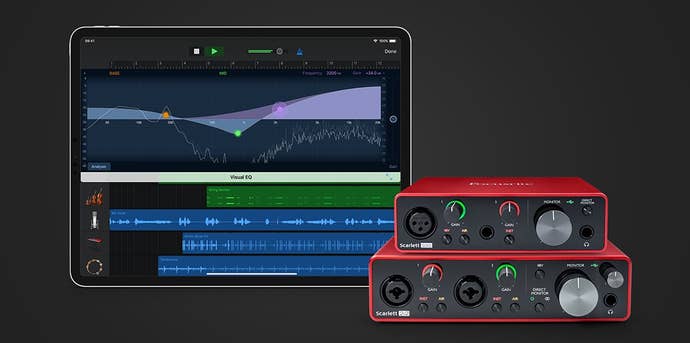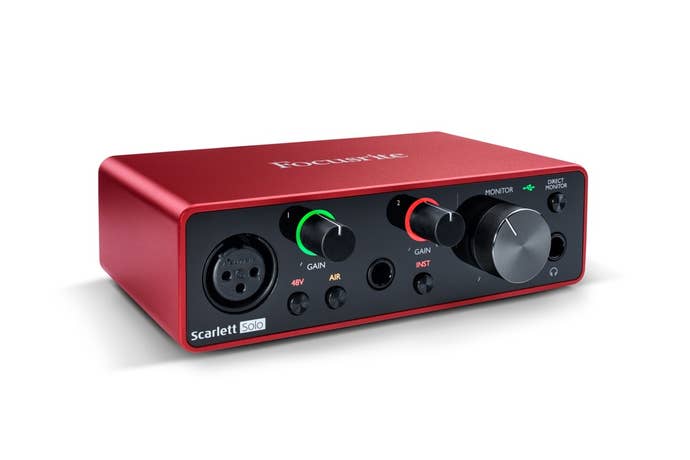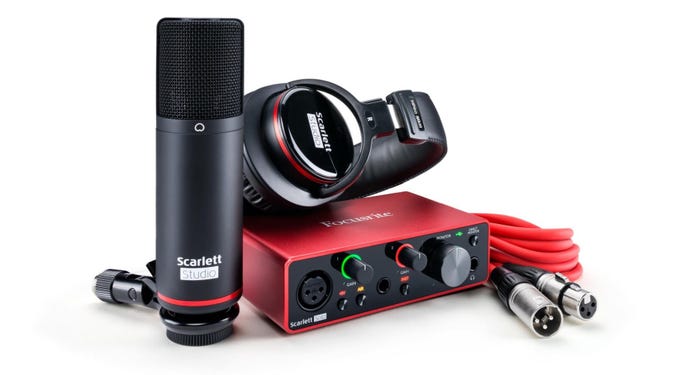Focusrite Scarlett Studio Bundle Review - Do you need the Scarlett 2i2 or Solo for streaming?
Do you need an XLR mic and audio interface for streaming?
They might not be the flashiest piece of tech you can add to your desktop setup, but an audio interface unlocks so many interesting audio opportunities, that it might just be one of the most exciting - if you’re a total nerd, that is.
Despite being a little bit more expensive than the real bargain basement options, the Solo and 2i2 in the Focusrite Scarlett series are easily some of the best audio interfaces you can pick up as an enthusiast.
Focusrite Scarlett Studio Bundle Review
With a relatively accessible price point and a feature set that actually works for a lot of different use cases, both the Solo and 2i2 in the Scarlett series are easy to recommend.
But just in time for the gifting season, they’re now available in the Focusrite Scarlett Studio Bundle, which packs in either the 2i2 or Solo with an XLR microphone and pair of monitor headphones for a comparable price to premium USB microphones.
While the bundled extras are quite utilitarian - the monitors aren’t nearly as comfortable as the best headsets around - the audio interface is great and the microphone is good, despite not having the really simple and streamlined software of USB-connected competitors.
It’s easy to categorise USB microphones as the simple, “plug-in-and-play” option and paint XLR as the more professionally-focused, granular alternative. However, in my experience, this isn’t as much down to the hardware as the software included with the products.
In terms of connecting a Focusrite Scarlett to your computer and hooking up a microphone, it’s just as easy as anything else, just with one extra layer. It’s when you get to implementing things like noise reduction that the proprietary audio suites you get with something like the Yeti X or EPOS B20 give you a simpler pathway than diving into third-party solutions.
This is where you can really see that Focusrite is more geared towards music recording than streaming, because what you do get with the Studio Bundle though is a load of free plugins and starter recording workspaces - great if you’re playing music, less so if you want squeaky clean audio for your stream.
But on the flip side, although it’s a lot more work, you could see this as an opportunity to create a more customised sound suite for yourself - the whole point of getting an XLR is having a professional level of flexibility after all. Even with more premium options, like the aforementioned EPOS B20, the included audio software with USB mics can leave a lot to be desired and here you can just focus immediately on putting together something that works for you.
In terms of value in the Studio Bundle, despite coming in a big exciting box that genuinely would make a fun gift regardless of the very practical nature of the product, the included monitor headphones and microphone in the Focusrite Studio Bundle aren’t the best, so you could consider picking up the interface on its own if you’re buying for yourself.

However, you would get nowhere close to snagging a better pair of cans and plusher microphone within the ~£70ish you’ll save opting for just the little red box, so if you don’t have a suitable set of over-ears or an XLR-connected mic already, or plan for this to be the only audio outlay you make, it’s not an actively bad deal. But if your budget stretches to the extra couple of hundred it would take to pick up one of the more popular XLR microphones and a fancier set of headphones, there’s no point paying for what you’d upgrade anyway.
In this regard, it’s also worth noting that the included microphone with the Focusrite Studio Bundle is a condenser microphone. “Condenser” mics are more sensitive to noise than the “dynamic” XLR-connected microphones people usually opt for when streaming, since dynamic mics are better at leaving out the background intrusions that come up often in a gaming stream like a PC fan or clacking mechanical keyboard.
Do you need an audio interface for gaming streaming?
The simple answer here is probably not. You could definitely get away using a USB microphone, and there’s a reason that the Blue Yeti is ubiquitous on the streams of hobbyists and pros alike.
But by that same token, there’s also a reason audiophiles swear by XLR-connected mics and baulk at the claims of more expensive USB options.
Why would you need an audio interface for gaming streaming then?
If you want high-quality audio that’s still flexible enough to do fun stuff with, then you need an audio interface and XLR mic. For example, if you want to add some silly modulations to your repertoire - like emulating the narrator from Darkest Dungeon or putting autotune on your voice - then having a clean signal makes that much easier and is something a lot of big streamers do.
A lot of USB microphones are very self-contained, only working with the bundled software they come with and therefore are only as good as that program. Whereas working with a Focusrite Scarlett you can take your audio to more creative places.
What’s more, interfaces in general, and specifically the Focusrite Scarlett series, have a Direct Monitor function, which lets you hear the audio signal going into the unit. Whether you’re podcasting or streaming, this lets you keep an eye - or rather an ear - on what’s happening, so you can adjust the levels to stop sounds from clipping if things get raucous, or tell if your viewers/listeners really can hear your significant other singing in the shower from upstairs.

Outside of gaming streams, both the Focusrite Scarlett 2i2 and Solo feature instrument inputs which let you record your own physical instruments into a DAW like (the included) Pro Tools or use your computer as an essentially silent amplifier.
The Scarlett series stands out as an affordable audio interface that doesn’t ruin your instrument signal with absolutely gnarly distortion if you try to play something with a little chest hair - making it perfect for rock and metal players, or any style of guitarist, bassist, or other musician looking to take advantage of the plethora of awesome free amp sims or effect suites out there.
So while you might not want to take advantage of these right now, you know it’s not going to be unusable should you ever want to in future.
Do you need the Focusrite Scarlett 2i2 or Solo?
When you’re making the choice of whether to buy the Scarlett 2i2 or Solo, you don’t need to worry about the insides. Both interfaces feature the same quality innards, and really, the only choice you’re making is whether you need two full XLR inputs, or one.
If your use case is streaming or recording a podcast with two people in the same room, each with their own XLR microphone, then you need the 2i2 to record them both simultaneously.
But if you’re flying… solo… the Scarlett Solo has the single XLR input you need, as well as an additional instrument input you can use for a guitar or similar music maker.
Is the Focusrite Scarlett Studio Bundle Worth it?
As we discussed above, although the included headphones aren’t the most comfortable, you would have to buy very 2nd-hand to see a marked improvement for the same price as the Focusrite Studio Bundle.
On the input side, the included condenser microphone isn’t ideal for a busy computer desk and investing in a different, dynamic microphone could serve you better in noisy environments.
However, saying that, the Scarlett Studio Bundle mic has performed better for me than a lot of others I’ve tried, especially with extra noise suppression - so it’s definitely good enough. But then you have to weigh up why you’re even bothering with an audio interface; if it’s to have near-perfect, background-free sound for your stream or podcast, then maybe you want to look at a dynamic microphone.
At the time of writing, a Scarlett Solo sets you back ~£90 on Amazon UK, with the Studio Bundle coming in at just over £160. When the most popular standalone XLR mics cost around £100, with some closer to £300 on their own, you can see that there’s a decent value proposition in the bundle, even if you do end up eventually upgrading the accessories.


